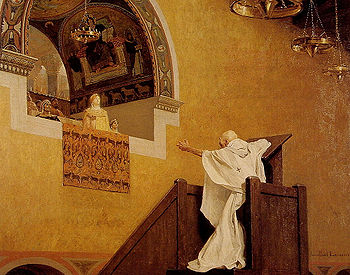| English: The story of the Eden Garden. The temptation of Adam & Eve by the devil. Pedestal of the statue of Madonna with Child, western portal (of the Virgin), of Notre-Dame de Paris, France Français : L'histoire du Jardin d'Eden. Au premier plan la tentation d'Adam & Eve par le Diable. Base de la statue de la Vierge à l'Enfant, trumeau du portail de la Vierge, Façade ouest de Notre-Dame de Paris. (Photo credit: Wikipedia) |
| John Chrysostom and Aelia Eudoxia (Photo credit: Wikipedia) |
| St John Chrysostom (c.349—407) Archbishop of Constantinople (398—404) (Photo credit: Wikipedia) |
During the early
centuries of the Church education was limited to the theological interest of
the Church. The persecution of the early church made it difficult for most
Christian communities to participate in serious theological discourse. The
educated clergy were products of what we would recognize as a classical
education based on the great thinkers of the predominant Roman and Greek
culture at the time. Other Christian communities were influenced by the
education systems predominant in Middle Eastern and African culture at the
time.
This all provided fertile intellectual ground for the
early leaders of Christian communities to draw from and refine Christian
teaching. In periods of time when the Church was not driven so far underground
monasteries were established .These monasteries were the first centers of
Christian learning. Later, schools were established by Teutonic Christians to
teach the Catechism. These Catechumen schools were initially for adult
converts.
Later, they catered to children and focused on matters of
orthodox faith. They can be thought of as early Sunday schools. Eventually
these schools taught reading and writing .The also took on curriculum's that
taught the philosophical foundations of Greek and Roman society as a way to
understand the theology and history of the Church. The by product of this
teaching was that during the dark ages much of most important teaching of
classical cultures was preserved. Even in times of persecution the early Church
fathers had views on what constituted a good Christian education.
Clement of Alexandria
He saw faith as the foundation of all learning including
secular. Clement looked to impart the concept of reason into early Christian
teaching. Clement used Mosaic Law and the classical philosophies of ancient Greece and Rome
Origen (186-253)
Origen took a more personal approach to early Christian
education. He believed that the Christian instructor could not legitimately
teach any as ethic practice they did not engage in themselves.Oriegen took this
approach because he believed the goal of all education was to become more
Christ like. The Christian instructor was to be a spiritual director of sorts
and help students focus on their own character flaws that had the potential to
draw their focus away from God and the work of the church. Still the role of
teacher was to direct students into their own spiritual discovery rather than
insist on some sort of spiritual conformity.
.
Basil the Great (329-379)
Basil was the first to advocate Christian education for
very young children. He saw no separation between preparing young Christians
for a holy life and parenting. Correction for young children and older students
revolved around monastic practices such as fasting and solitude. In formal
Christian education, Basil advocated classical education playing a secondary
role to use of Christian and Hebrew scriptures to teach theology.
.
Chrysostom (347-407)
Chrysostom saw mothers as the first and primary educators
in Christianity for young children. The Christian home was to be the foundation
of all later religious education with mother's being the most important
examples of Christ-like behavior for young children. He did advocate formal
instruction in Christian teaching for older children at which point the
instructor became the example of Christ in the world for the student.
Chrysostom believed that a teacher must have an
understanding of the world that the child had in order to effectively teach.
Religious teaching moved a child from rote instruction to one in which a child
would come to their own conclusion without the instruction of the teacher. In
Chrysostom view a teacher did not do for a student what they in the end learned
to do for themselves. Religious instruction was seen as the foundation of all
later secular learning and lens which secular learning was judged. Chrysostom
saw his own ability to be a great orator as a result of his pagan education and
did not see that type of training in conflict with essential Christian
teaching. He advocated using secular learning in all forms to advance the work
of the Church.
During the Dark Ages, 401 to 451 A.D Benedictine Monks who
were missionaries among Anglo-Saxon, Frisians, and Thurigians peoples preserved
libraries they encouraged scholars to study the agricultural knowledge of the
great ancient civilizations and apply it to local farming. This is just one
example of how religious instruction in the early church came to preserve and
promote practical knowledge of humanity at a time of great social upheaval. The
church in this time was the only social structure with enough power to preserve
centuries of vital human knowledge in a world where such things could have been
lost for eternity. The Church becoming main source of secular as well as
religious instruction by being truly catholic in nature became the foundation
of all education in Europe and eventually in the United States
Sources:
Anglo Catholic Prespective.














